After three inconclusive rounds in the preceding days, in which nobody secured the two-thirds majority needed to win, on the morning of 31 January 2015 a fourth round of voting was held in the Italian Parliament to elect the country’s President. This time, a simple majority of the 1,009 eligible voters (the members of both Chambers of the Parliament plus some delegates from the Regions) was enough to decide the election.
The post Reference and the election of the new Italian President appeared first on OUPblog.
The Roosevelts: Two exceptionally influential Presidents of the United States, 5th cousins from two different political parties, and key players in the United States’ involvement in both World Wars. Theodore Roosevelt negotiated an end to the Russo-Japanese War and won the 1906 Nobel Peace Prize. He also campaigned for America’s immersion in the First World War. Almost 25 years later, Franklin Delano Roosevelt came into office during the calamitous aftermath of the Great Depression, yet during his 12-year presidency he contributed to the drop in unemployment rates from 24% when he first took office, to a staggering mere 2% when he left office in 1945. Furthermore, the first lady Eleanor Roosevelt encouraged discussion and implementation of women’s rights, World War II refugees, and civil rights of Asian and African Americans even well-after her husband’s presidency and death. Witness the lives of these illustrious figures through this slideshow, and take a look at the first half of 20th century American history through the lives of the Roosevelts.
-
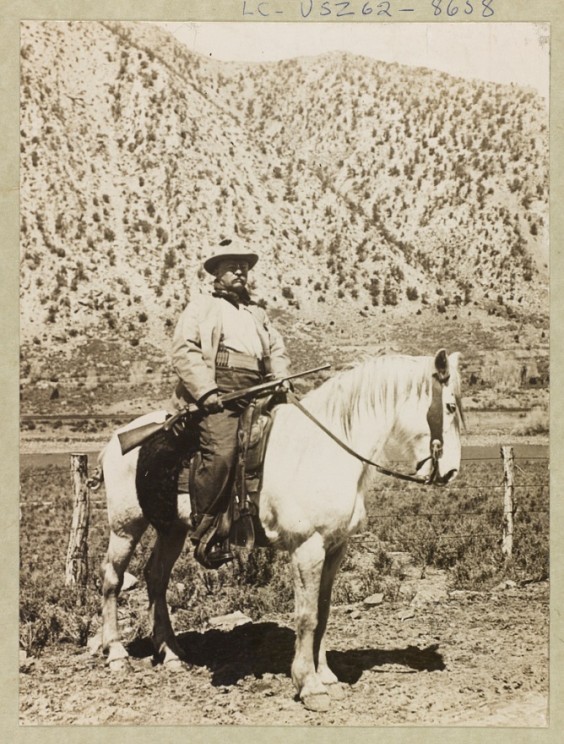
Theodore Roosevelt
“[Theodore] Roosevelt used his bully pulpit to shape public opinion on many subjects. Conservation of natural resources received special emphasis…. Earlier presidents had done little to protect scenic places and national parks against the wasteful exploitation of the environment…. The president achieved much, creating five national parks, four national game preserves, fifty-one bird reservations, and one hundred and fifty national forests” (Lewis L. Gould, Theodore Roosevelt, 43). Public domain via the Library of Congress
-

Theodore Roosevelt
In 1909 and 1910, after finishing his second term as president, Roosevelt traveled to Africa on safari. While abroad, the American public grew increasingly fascinated with Roosevelt and “to satisfy popular demand, [Theodore Roosevelt] recruited a friendly reporter, Warrington Dawson, to recount the progress of the hunt for the press corps. When Roosevelt returned first to Europe and then home in the spring of 1910, it was to intense popular acclaim everywhere.” (Lewis L. Gould, Theodore Roosevelt, 52). TR (center, facing sideways) on safari, 1910. Public domain via the Library of Congress.
-
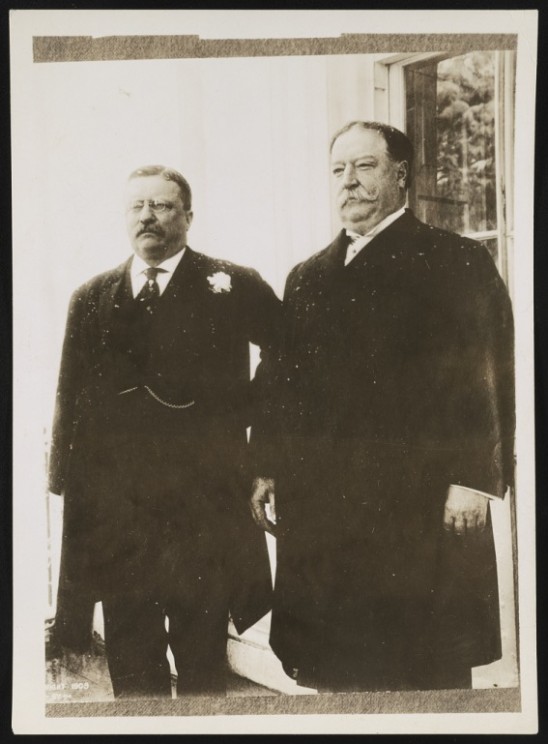
Theodore Roosevelt and William Howard Taft
“Taft was a first-class lieutenant; but he is only fit to act under orders; and for three years and a half the orders given him have been wrong. Now he has lost his temper and is behaving like a blackguard.” (Theodore Roosevelt to Arthur Lee, dated May 1912, from the Papers of Lord Lee of Fareham.) After leaving office in 1908, Theodore Roosevelt’s relationship with his personally-selected successor, William Howard Taft, soured due to policy differences. Theodore Roosevelt decided to run for an unprecedented third term against President Taft in 1912 as a third-party candidate. Theodore Roosevelt and his newly-founded Progressive Party were ultimately defeated by Democratic candidate Woodrow Wilson in the general election. Theodore Roosevelt and William H. Taft, c. 1909. Public domain via the Library of Congress.
-

Franklin Delano Roosevelt with his mother, Sara
“Franklin grew up in a remarkably cosseted environment, insulated from the normal experiences of most American boys, both by his family’s wealth and by their intense and at times almost suffocating love…. It was a world of extraordinary comfort, security, and serenity, but also one of reticence and reserve.” (Alan Brinkley, Franklin Delano Roosevelt, 4). Franklin Delano Roosevelt with his mother, Sara, 1887. Public domain via Wikimedia Commons.
-
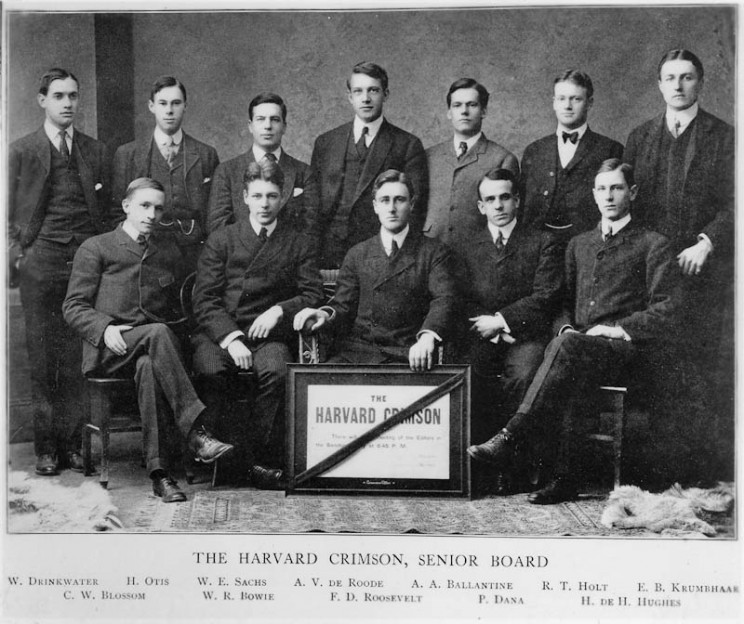
FDR at Harvard
“Entering Harvard College in 1900, [FDR] set out to make up for what he considered his social failures [as a boarding school student at] Groton. He worked hard at making friends, ran for class office, and became president of the school newspaper, the Harvard Crimson, a post that was more a social distinction at the time than a journalistic one. (His own contributions to the newspaper consisted largely of banal editorials calling for greater school spirit.)” (Alan Brinkley, Franklin Delano Roosevelt, 5). FDR as president of the Harvard Crimson, with its Senior Board in 1904. Public domain via the Franklin Delano Roosevelt Library.
-
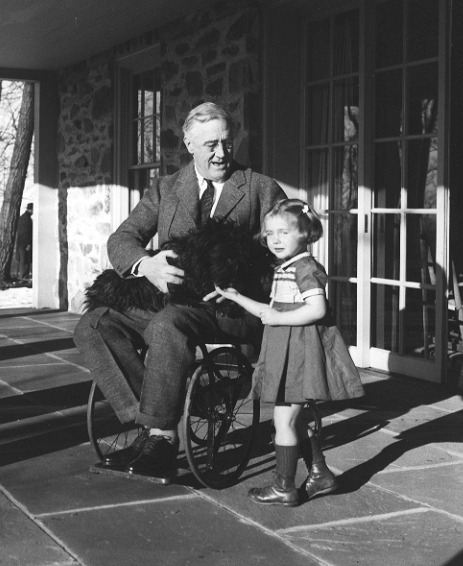
FDR and Polio
In August of 1921, Roosevelt fell ill after being exposed to the poliomyelitis virus. “He learned to disguise it for pulic purposes by wearing heavy leg braces; supporting himself, first with crutches and later with a cane and the arm of a companion; and using his hips to swing his inert legs forward…So effective was the deception that few Americans knew that Roosevelt could not walk” (Brinkley, Franklin Delano Roosevelt, 18-19). Franklin D. Roosevelt, Fala and Ruthie Bie at Hill Top Cottage in Hyde Park, N.Y . Franklin Delano Roosevelt Library.
-
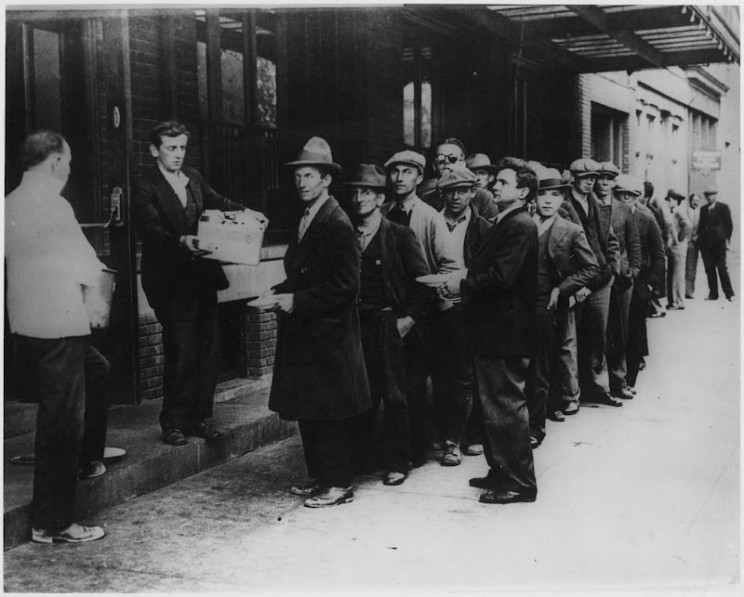
FDR and the Great Depression
Depression breadlines. In the absence of substantial Gov’t relief programs during 1932, free food was distributed with private funds in some urban centers to large numbers of the unemployed. February 1932 Franklin D. Roosevelt Presidential Library & Museum, Photo 69146. Public domain.
-
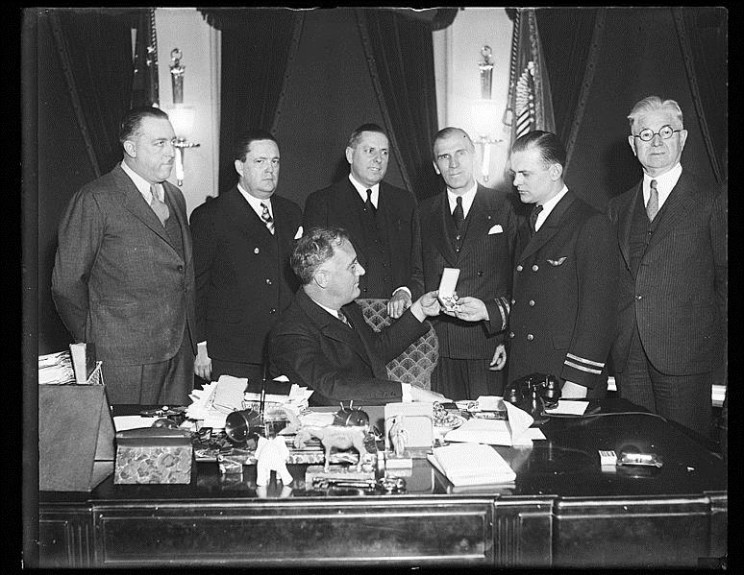
FDR and the New Deal
“When Franklin Delano Roosevelt took the oath of office as president for the first time on March 4, 1933, every moving part in the machinery of the American economy had evidently broken…. Roosevelt right away began working to repair finance, agriculture, and manufacturing…. The Roosevelt agenda grew by experiment: the parts that worked stuck, no matter their origin. Indeed, the program got its name by just that process: Roosevelt used the phrase “new deal” when accepting the democratic nomination for president, and the press liked it. The “New Deal” said the Roosevelt offered a fresh start, but it promised nothing specific: it worked, so it stuck.” (Rauchway, The Great Depression and the New Deal: A Very Short Introduction, 56). Franklin Roosevelt at desk in Oval Office with group, Washington, D.C. 1933. Library of Congress, Harris & Ewing Collection. Wikimedia Commons.
-
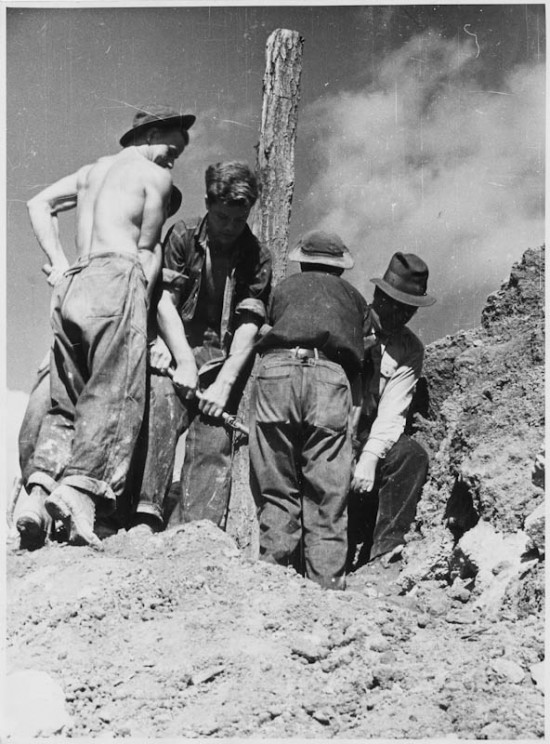
FDR and the New Deal
In the beginning of his presidency, Roosevelt proposed a “New Deal.” Over time, it “created state institutions that significantly and permanently expanded the role of federal government in American life, providing at least minimal assistance to the elderly, the poor, and the unemployed; protecting the rights of labor unions; stabilizing the banking system; building low-income housing; regulating financial markets; subsidizing agricultural production…As a result, American political and economic life became much more competitive, with workers, farmers, consumers, and others now able to press their demands upon the government in ways that in the past had usually been available only the corporate world” (Brinkley, Franklin Delano Roosevelt, 61). “CCC boys at work–Prince George Co., Virginia.” Franklin D. Roosevelt Presidential Library & Museum
-
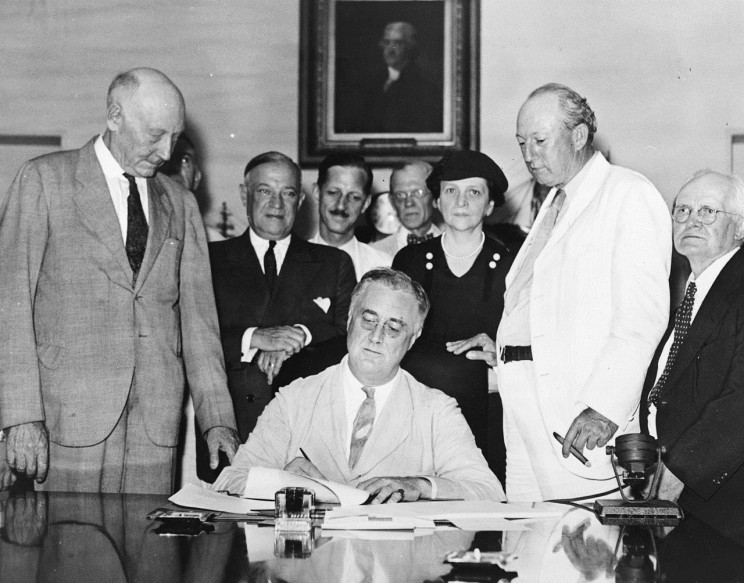
FDR and the Social Security ct
President Roosevelt signed the Social Security Act, at approximately 3:30 pm EST on August 14th, 1935. Standing with Roosevelt are Rep. Robert Doughton (D-NC); Sen. Robert Wagner (D-NY); Rep. John Dingell (D-MI); Rep. Joshua Twing Brooks (D-PA); the Secretary of Labor, Frances Perkins; Sen. Pat Harrison (D-MS); and Rep. David Lewis (D-MD). Library of Congress. Wikimedia Commons.
-

FDR and the Social Security Act
One of the most important pieces of social legislation in American History was The Social Security Act of 1935. The Act was part of Roosevelt’s Second New Deal (from 1935-38). The Social Security Act set up several important programs, including unemployment compensation (funded by employers) and old-age pensions (funded by a Social Security tax paid jointly by employers and employees). It also provided assistance to the disabled (primarily the blind) and the elderly poor (people presumably too old to work). Furthermore, it established Aid to Dependent Children (later called Aid to Families with Dependent Children, or AFDC), which created the model for what most Americans considered “welfare” for over sixty years (Brinkley, Franklin Delano Roosevelt, 51-52). Roosevelt said, “No one can guarantee this country against the dangers of future depressions, but we can reduce those dangers” (Kennedy, Freedom from Fear, 270). This is a poster publicizing Social Security benefits. Public Domain via Franklin D. Roosevelt Library.
-
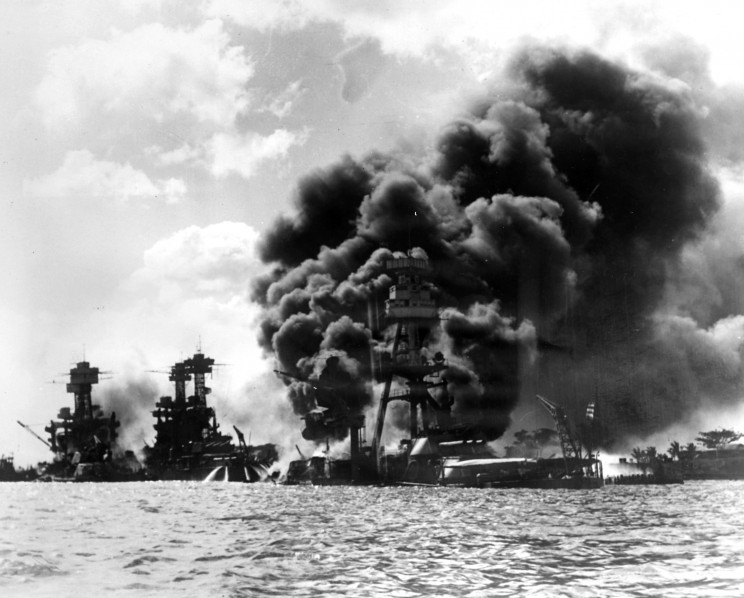
FDR and the Second World War
When war finally broke out in Europe in September 1939, Roosevelt continued to insist that the conflict would not involve the United States. Roosevelt declared, “This nation will remain a neutral nation, but I cannot ask that every American remain neutral in thought as well.” Then, on December 7th, 1941, a wave of Japanese bombers struck the American naval base in Pearl Harbor, Hawaii, killing more than 2,000 American servicemen and damaging or destroying dozens of ships and airplanes. Roosevelt called it, “a date which will live in infamy” (Brinkley, Franklin Delano Roosevelt, 68). View looking up “Battleship Row” on 7 December 1941, after the Japanese attack on Pearl Harbor. The battleship USS Arizona (BB-39) is in the center, burning furiously. To the left of her are USS Tennessee (BB-43) and the sunken USS West Virginia (BB-48). Official U.S. Navy Photograph. Wikimedia Commons.
-
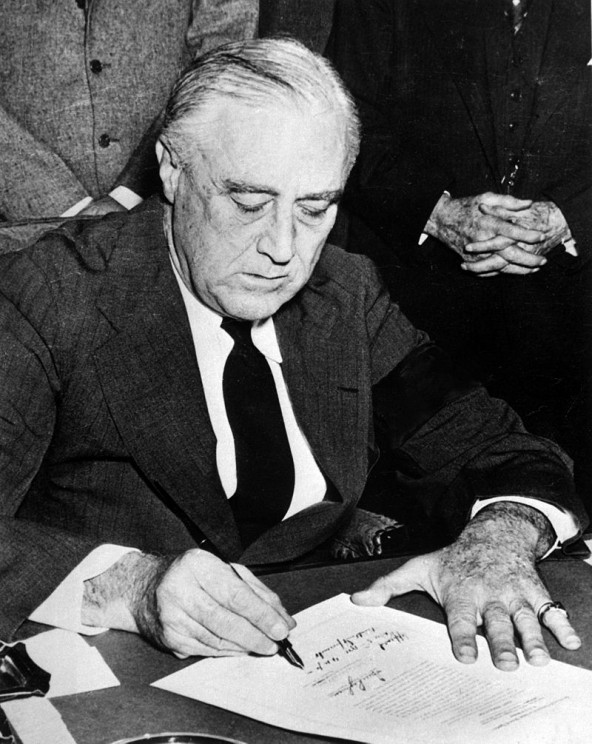
FDR and the declaration of war
“The Senate and House voted for a declaration of war—the Senate unanimously, and the House by a vote of 388 to 1. Three days later, Germany and Italy, Japan’s European allies, declared war on the United States, and the American Congress quickly and unanimously reciprocated” (Brinkley, Franklin Delano Roosevelt, 75-76). United States President Franklin D. Roosevelt signing the declaration of war against Japan, in the wake of the attack on Pearl Harbor. US National Parks Service via Wikimedia Commons
-
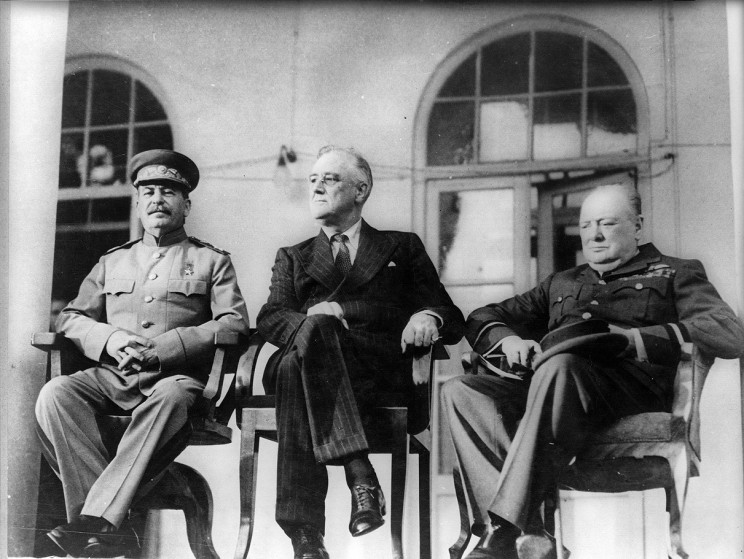
The Big Three
Shown here are ‘The Big Three’: Stalin, U.S. President Franklin D. Roosevelt, and British Prime Minister Winston Churchill at the Tehran Conference, November 1943. At this time, war in eastern Europe had turned decisively in favor of the Soviety Union, which meant that Roosevelt and Churchill now had little leverage over Stalin. Even so, Stalin agreed to enter the Pacific war after the fighting in Europe came to an end. Roosevelt and Churchill promised to launch the long-delayed invasion of France in the spring of 1944 (Brinkley, Franklin Delano Roosevelt, 83). US Signal Corps public domain photo.
-
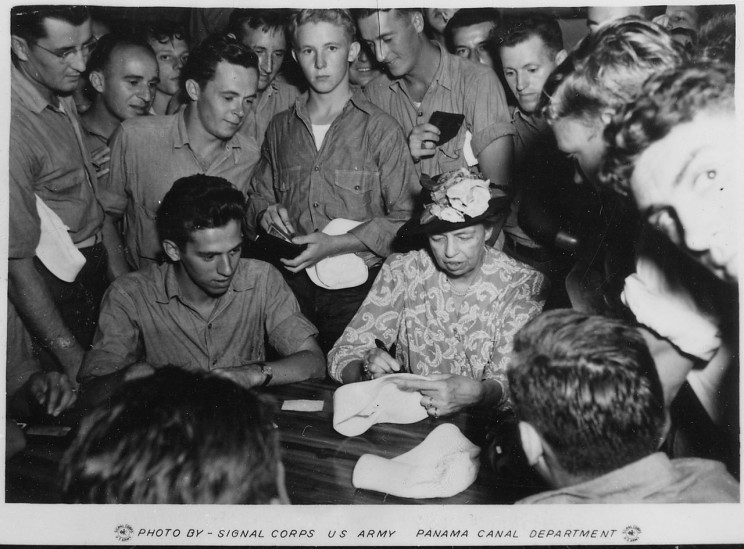
Eleanor Roosevelt and the Second World War
An outspoken and publicly active First Lady, Eleanor Roosevelt was active both on the homefront and overseas. Her visits drew crowds of people and welcomed her favorably and amiably. This resulted in positive press being written about the Roosevelts across the United States as well as Britain. Eleanor Roosevelt visiting troops in Galapagos Island. US National Archives and Records Administration
-
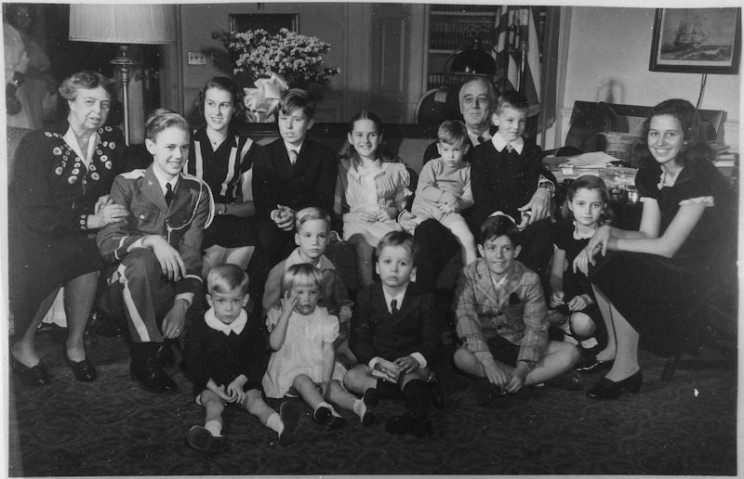
The Roosevelt Family
Franklin D. Roosevelt and Eleanor Roosevelt with their 13 grandchildren in Washington, D.C. in January of 1945 (Archivist note: This photograph was taken at FDR’s fourth inauguration. This is one of the last family photographs taken before FDR’s death.) Franklin D. Roosevelt Presidential Library & Museum.
-
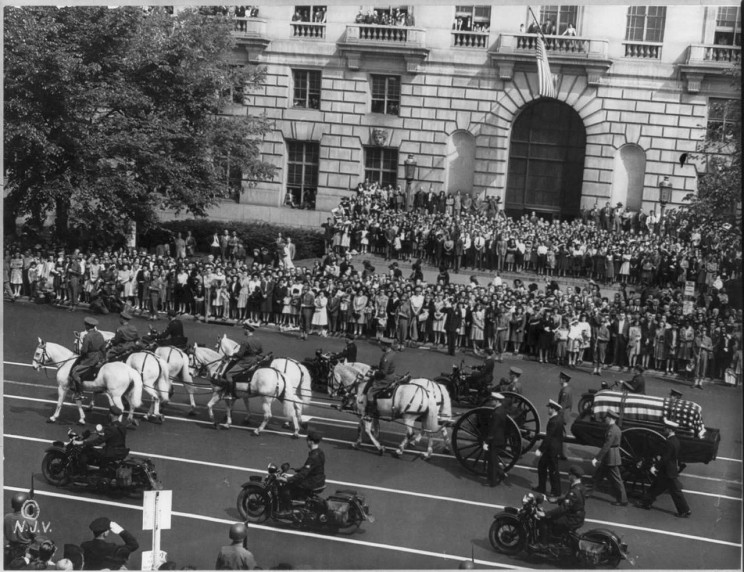
FDR's death
Franklin Delano Roosevelt died of a stroke in on 12 April 1945. In the decades since his death, his stature as one of the most important leaders of the twentieth century has not diminished. “History will honor this man for many things, however wide the disagreement of many of his countrymen with some of his policies and actions,” the New York Times wrote the day after his death. “It will honor him above all else because he had the vision to see clearly the supreme crisis of our times and the courage to meet that crisis boldly. Men will thank God on their knees, a hundred years from now, that Franklin D. Roosevelt was in the White House” (The New York Times, 13 April 1945). Roosevelt’s funeral procession in Washington in 1945; watched by 300,000 spectators. Library of Congress.
-
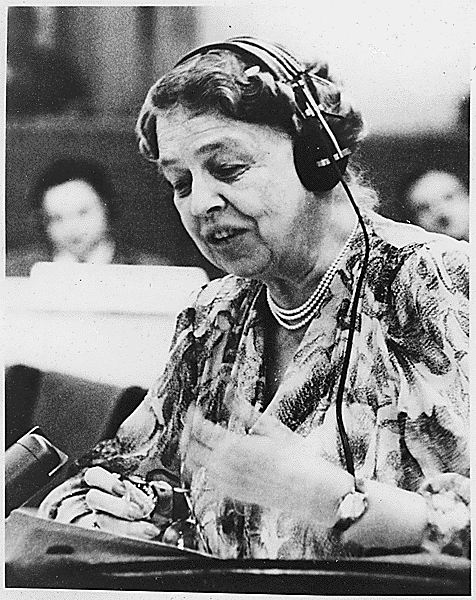
Eleanor Roosevelt
The remaining 17 years that Eleanor Roosevelt lived after her husband passed away were years in which she carried out her humanitarian efforts and maintained the integrity of the Roosevelt name. The next President Harry Truman appointed Eleanor as a delegate to the United Nations General Assembly, and less than a year later, she became the first chairperson of the preliminary United Nations Commission on Human Rights. She also chaired the John F. Kennedy administration’s Presidential Commission on the Status of Women. To this day, she is quoted, and referred to with great respect and admiration for her efforts in human rights and politics. Roosevelt speaking at the United Nations in July 1947. Franklin D. Roosevelt Presidential Library and Museum.
Headline image credit: The Roosevelt Family. Library of Congress. The post A visual history of the Roosevelts appeared first on OUPblog.

If you’re a political junkie like me, then you love presidential election years. Seriously, I live for election night coverage… it’s my Super Bowl! (I’m not kidding. I have laid in bed late at night and checked my iPhone just to find out if returns came back from close-to-call caucuses and primaries earlier this year.) [...]
I absolutely love making children's illustrations but once in a while it's nice to draw something more adult oriented. This week's
Philadelphia Weekly features my cartoon take on the crazy candidates. Since I love drawing crazy people in general, this one was right up my alley.
Whether you're liberal, conservative or somewhere in between we all have to admit that most politicians are bonkers.
By the way, the Presidential seal is really hard to draw.
As you know, the ALA/YALSA election season has started. Polls are open March 19 through April 27 and YALSA has candidates on the association’s slate running for governance positions and candidates running for awards positions. In this post I’ll talk about the governance positions and provide information on resources you can access to learn more about the positions. The information should also help you think about what you want to consider when you cast your ballot. (Next week 2012 YALSA Nominating Committee member Dawn Rutherford will post on the awards slate with information on those positions.)
This year the positions open on the YALSA governance slate are (the full slate is available on the YALSAblog):
- President-elect/President
- Board of Directors
- YALSA Councilor
You may have heard of all of these positions but aren’t really sure what the people in them actually do. Here’s a brief run-down:
- President-elect/President: The person serving as YALSA President-elect and then President is as a member of YALSA’s Executive Committee as well as a member of YALSA’s Board. As President-Elect this YALSA leader participates fully in all Board meetings and Executive Committee meetings. She is responsible, during the President-Elect year, for appointing members to YALSA member groups including process and selection committees. And, during this elect year she works closely with the President and Past President on association planning. During the Presidential year the elected candidate runs all YALSA meetings including Board and Executive Committee meetings. She is responsible for representing YALSA at official events at Midwinter Meeting and Conference. She works closely with the Executive Director, President-Elect, and Past President on planning leadership and governance activities including drafting agendas and Board documents.
- YALSA Councilor: The YALSA Councilor is a full member of the YALSA Executive Committee and the YALSA Board. He or she is required to attend all Executive Committee meetings, all association Board meetings, and all ALA Council meetings. As YALSA’s representative to ALA Council, the Councilor is expected to speak up for issues that have an impact on teens at Council meetings. He or she is expected to bring topics of concern from Council to the YALSA Board as well as bring similar topics from the YALSA Board to Council. He or she is also expected to actively participate in the Youth Council Caucus, which is made up of all of those on ALA Council that are involved in serving youth. You can read more about the Councilor position on the YALSA website.
- Board of Directors: Each person elected to a YALSA Board of Director position is expected to participate fullly in the governance activities of the association 12 months a year. These members are required to attend face-to-face meetings at Annual Conference and Midwinter as well as a series of virtual and phone meetings held throughout the year. Board members serve as liaisons to all YALSA member groups including process and selection committees, task forces, and juries. Often Board members are asked to take on work as a part of an ad hoc committee that is investigating a particular activity in which YALSA is or might be involved. More information on the duties and responsibilities of YALSA Board members is available on the YALSA website.
For each of these positions strong leadership skills are required. These includ
It began with John McCain’s selection of Sarah Palin as his running mate in 2008. The choice of this incompetent, unqualified, inexperienced, and stupid person as a vice presidential candidate called McCain’s judgment into serious question. Had the old war hero turned senile? How could he have put such a person a heartbeat from the Presidency? The mere thought of Palin in the White House was frightening. But McCain’s choice was far more than a scare—it insulted America and unleashed a wave of violence and racism that continues.
Never forget the crosshairs map Palin posted on her Facebook page. She urged her Twitter followers, “Don’t retreat, reload.” Arizona Congresswoman Gabrielle Giffords’ face was in one of the crosshairs. On January 8, 2011, Congresswoman Giffords was shot in the head outside a Tucson Safeway supermarket. Fortunately she survived and is making a remarkable recovery. But America is still coping with the incivility and insults initiated by Palin and taken up by the Tea Party and Congressional Republicans.
The insults continued after President Obama was elected and took office. With exhortations to “take back our country,” the Tea Party, overwhelmingly made up of whites, spread its unsubtle racist message. It didn’t take a rocket scientist to figure out that “take back our country” meant take it back from the black guy who’s President.
Four days before the President was inaugurated, the tone was set by radio talk show bloviator Rush Limbaugh. On January 16, 2010, Linbaugh said, “I hope Obama fails.”
During the President’s first term, Congressional Republicans took up Limbaugh’s mantra, deciding to do everything in their power to destroy the Obama presidency by holding up, blocking, weakening, misrepresenting, and voting against everything the President and Democrats wanted to accomplish.
Republican senator Mitch McConnell stated the Republicans’ position quite clearly: “The single most important thing we want to achieve is for President Obama to be a one-term president,” McConnell told Major Garrett in an interview published in the National Review in October 2010. A month later, in a speech to the conservative Heritage Foundation, he repeated his position: “Our top political priority over the next two years should be to deny President Obama a second term.” In another time, such a call of opposition to a sitting President would have been considered treason. But over the past two years, Republicans have, like obedient little soldiers, followed McConnell’s marching orders, turning their backs on their country and the people who elected them and abandoning their responsibility to participate in government.
Despite repeated attempts by the President to work in a bipartisan fashion, Republicans refused, becoming the “Party of No.” No to health care for all Americans. No to the President’s job creation bill. No to restoring regulations of the banks whose fraudulent practices caused the worst economic meltdown since the Great Depression. No to repealing the Bush tax cuts that added billions of dollars to the deficit. No to taxing millionaires and billionaires so they pay their fair share. Last summer, Republicans’ political brinksmanship with the debt ceiling resulted in the first downgrade in the national credit rating in U.S. history. In carrying out Rush Limbaugh and Mitch McConnell’s dictum to bring about failure of the Obama administration, Republicans have made Congress dysfunctional and the economic recovery slower than it might have been had they spent more time working with the President instead of working against him. That President Obama has been able to accomplish so much despite Republicans’ intransigence is a tribute to his political skill, patience and intelligence.
Now we come to this election year and the line-up of potential Republican presidential candidates who are as insultingly unqualified as Sarah Palin. All celebr
By Louis René Beres
Apart from their obvious differences, all of the candidates, both Democrat (President Obama) and Republican, have one overriding chant in common. For each aspirant, every pitch is prefaced by sanctimonious appeals to "the people." Whether openly, or with a quiet nod to a presumably more subtle strategy, "I want to be the people's president" is always their conspicuously shared mantra.
This is not hard to understand. To suggest otherwise

Author and former children's laureate Michael Morpurgo has been appointed as the inaugural president of the Historical Writers Association.
Founder and chair of the HWA Manda Scott said: "It's an honour and a privilege to welcome Michael Morpurgo as our inaugural president. We couldn't ask for a better way to mark our first anniversary as an association and look forward to a long and fruitful relationship, promoting historical writing in all its forms together."
read more
 White House videographer Arun Chaudhary has landed a book deal with Henry Holt & Company’s Times Books division. The book is slated for a summer 2012 release.
White House videographer Arun Chaudhary has landed a book deal with Henry Holt & Company’s Times Books division. The book is slated for a summer 2012 release.
Chaudhary will tell the story of how he went from teaching at New York University professor to documenting Barack Obama‘s presidency. Editor Serena Jones negotiated the deal with Zachary Shuster Harmsworth literary agent Bridget Wagner.
In the announcement, Chaudhary said the book will focus on “the interplay of art, media, and politics through the prism of the historic Obama campaign and presidency … You won’t learn what the President eats for breakfast, but you will find out what makes space hero Buzz Aldrin mad in a staff van at 8 a.m.”
New Career Opportunities Daily: The best jobs in media.
The wasteful attitude of the American society has reached a level of absurdity hitherto unmatched, or so it seems to me.
Here’s an example for you. Last week Yahoo News reported that Mitt Romney, that political candidate for presidential campaigns, intended to raze his $12 million home in California to build a bigger, more costly model.
When I read this assertion, my question flag began flapping in the breeze. If this person ever made it into the White House, what perfectly good taxpayer item would he raze in order to spend even more taxpayer money for vanity’s sake? I also asked myself how anyone could be so wasteful in the face of the current economy.
A couple of days later my sister and I returned home from the grocery store, frustrated and irate. We commented—okay, we complained—about the current price of fresh produce. We understand all the arguments about supply and demand, etc. Those weren’t the questions we were discussing.
Instead, we discussed the question of how those who were on restricted diets for medical reasons, like diabetes and heart disease, were expected to afford the continuing price increases with a shrinking dollar. On the tail of that question was another one that asked, perhaps, an even more critical question. How can grocers dispose of perfectly good produce at the end of a work day by throwing it into dumpsters in the back alley?
NAW, you say. Unfortunately, that is a practice that’s been going on for years. If I had the time, I’d research out the mandates of health departments and USDA rulings to uote those covering the length of time fresh produce can be displayed in stores before mandatory disposal. If you stop to think about how grocers display produce, you’ll quickly figure out why such foods have a limited shelf life.
Okay, back to the subject. One of the aspects of this questionable practice that really angers us is that we don’t hear about any grocers who relieve themselves of this frequent burden of fresh food by donating it—as a charitable contribution, no less—to homeless shelters, women’s shelters, prisons, schools, etc.
I realize that for prisons and schools and any other institution that accepts moneys from the federal government, the red-tape necessary for such donations makes such generosity nigh on to impossible. But, organizations like Meals-On-Wheels, and shelters could certainly use the boost, as could local food banks.
For some obscure reason Americans with lots extra to give to solving public problems ha
By Bassem SabryIn early April, Bothaina Kamel, a female television presenter and media figure, announced that she would run for the office of the presidency. In a society where the idea of a woman leading a country, the judiciary, or serving any similar role is discouraged by both culture and religion (indeed, it is often outright banned), the presence of a woman in elections stirs up strong reactions from the public. A cursory glance at the news articles that have mentioned her after she declared her candidacy feature such statements as: “Are we so out of men that we would be run by a woman?”

 Former Sarah Palin aide Frank Bailey has landed a deal with Simon & Schuster’s Howard Books. His memoir, Blind Allegiance to Sarah Palin, will be released on May 24th.
Former Sarah Palin aide Frank Bailey has landed a deal with Simon & Schuster’s Howard Books. His memoir, Blind Allegiance to Sarah Palin, will be released on May 24th.
Bailey became close to former vice presidential candidate Sarah Palin during her gubernatorial campaign; he remained in her inner circle during John McCain‘s presidential race. He co-wrote the memoir along with author Ken Morris and Mudflats blogger Jeanne Devon. On her site, Devon revealed that the three writers spent two years on this project.
Bailey had this statement in the press release: “I write because I am convinced that Sarah’s priorities and personality are not only ill-suited to head a political party or occupy national office, but would lead to a disaster of, well, biblical proportions.”
continued…
New Career Opportunities Daily: The best jobs in media.
By Adrian Vermeule
A trope of tyrannophobic political discourse compares the American presidency with the government of the Caesars. T.B. Macaulay addressed a comparison between the Caesars and the Tudor monarchs (Henry VII, his son, and his grandchildren) in terms both withering and illuminating:
It has been said … that the Tudors were as absolute as the Caesars. Never was a parallel so unfortunate. The Caesars ruled despotically, by means of a great standing army, under the decent forms of a republican constitution. Our Tudors, on the other hand, under the titles and forms of monarchical supremacy, were essentially popular magistrates. Though the legal checks on their activities were feeble, the natural checks were strong. It was impossible for them to carry oppression beyond a certain point. They knew that, if the patience of the nation were severely tried, the nation would put forth its strength, and that its strength would be found irresistible.(Macaulay, Burleigh and His Times, in the Essays).
In The Executive Unbound: After the Madisonian Republic, Eric Posner and I offer a picture of the American presidency, and the executive branch generally, that partakes of both the Caesars and the Tudors (as Macaulay portrays them). On one hand, the President commands a great standing army or indeed several of them, if we count his army of bureaucrats and advisers. Although the President rules “under the decent forms of a republican constitution” – the one from 1789 – his powers vastly exceed anything that could be inferred from the text of that document, principally because of the ever-increasing rate of change in the policy environment in the 20th century and the ever-diminishing institutional capacities of the Congress, both of which conspire to ensure that an ever-increasing amount of policy is made by the executive under broad and vague statutory delegations. Moreover, the presidency is the sole institution capable of acting in the real world, beyond the law books, and often proceeds through unilateral action, wielding “power without persuasion.”
On the other hand, the President, like the Tudor monarchs, is substantially constrained by the ambient force of mass public opinion and the implicit threat of political backlash. “Though the legal checks on [his] activities [are] feeble, the natural checks [are] strong.” Any modern President is a curious pushme-pullyu: possessing sweeping statutory and constitutional powers, he is enslaved to the opinion polls. Indeed, the administrative state over which the President reigns, and which is both a wellspring and a symptom of his power, itself tends to generate and sustain those political checks, in part because it helps to create a large class of secure, educated and wealthy elites who have both time and inclination to scrutinize executive action, donate to the American Civil Liberties Union and the Center for Constitutional Rights, and agitate against executive abuses.
So the answer to “the Caesars or the Tudors?,” as to the American presidency, might be “some of both.” But the even better answer – and this is actually the answer we give – is “neither,” because neither the Caesars nor the Tudors were elected (putting aside the need to maintain the loyalty of the legions or nobility). We envision the Constitution in 2020 as a plebiscitary, president-centered electoral democracy in which Congress and the courts have been reduced to marginal actors , who carp fr
By Michelle Rafferty
When did the commander-in-chief become a sex icon? That was the question I decided to pursue this Presidents’ Day. And of course the more people I spoke with, the more complex the question became. By the end of the investigation I learned some Americans continue to preserve a “pure” image of presidents past, while many find their sex lives highly relevant to our political history. Check out the slideshow below to see exactly what Oxford’s presidential experts had to say!
(To see a full image, click on the center of each slide.)
-
1
lightbox
-
2
lightbox
-
3
lightbox
-
4
lightbox
-
5
lightbox
-
6
lightbox
-
7
lightbox
-
8
lightbox
-
9
lightbox
-
10
lightbox
-
11

By: Lauren,
on 2/7/2011
Blog:
OUPblog
(
Login to Add to MyJacketFlap)
JacketFlap tags:
president,
birthday,
Barack Obama,
reagan,
this day in history,
Jimmy Carter,
republican,
George Bush,
Ronald Reagan,
New Deal,
*Featured,
reagan’s,
Gil Troy,
john sununu,
living in the eighties,
reagan revolution,
tax cut,
Biography,
US,
Add a tag
By Gil Troy
As we mark the centennial (Feb. 6th, 2011) of Ronald Reagan’s birth, the tug of war over his legacy continues. Reagan’s popular image – and popularity — have fluctuated as wildly as the stock market. One way to make sense of this is to think of Ronald Reagan as having nine public lives.
Central to the Reagan legend is this conservative Republican president’s origins as a Hollywood Democrat. Ronald Reagan was a New Deal Democrat who by the 1950s felt that the Democratic Party had lost its way. He always insisted: “Maybe my party changed. I didn’t.” And yes, Reagan was an actor. Actually, he never understood how anyone could be in politics without first having been in showbiz.
By 1966, when he ran successfully to become California’s governor, Reagan’s transformation was complete. During his two terms as governor, and during his triumphal 1980 run for the presidency, Reagan was known as a Conservative Ideologue, beloved by the right, disdained by the left. Although he won in an ABC election, with most Americans choosing Anybody But Carter, Reagan claimed he received a mandate for change.
Reagan started strong in his third incarnation, as the Reagan Revolutionary. He promised to cut the budget, reduce taxes, trim the bureaucracy, revive America, face down the Soviets. During his first seven and a half months in office, Reagan secured the largest budget cut in history – some $35 billion in domestic spending from Jimmy Carter’s request – and reduced the personal income tax rate by almost one quarter. Initially, Democrats were flummoxed. But by the summer of 1981, with Americans experiencing the highest unemployment rate since the Great Depression, Democrats attacked what they now called the “Reagan Recession.” Getting traction on the “Fairness Issue,” critics attacked the President as Mr. Magoo, a bumbling anti-Communist cowboy, a reverse Robin Hood and warmonger. They said he cut taxes for the rich and burdened the poor while risking nuclear war by calling the Soviet Union the “Evil Empire.” They mocked his gaffes, from blaming trees for causing air pollution to counting ketchup as a vegetable (which actually emanated from the Department of Agriculture not him). After Democrats surged in the 1982 Congressional midterm elections, pundits started eulogizing Reagan’s failed presidency.
Fortunately for Reagan, the economy revived before he had to face the electorate for re-election. With inflation tamed, jobs being created, American pride returned. Reagan reigned as a Popular Patriot. He blessed the prosperity as “Morning in America.” He pushed for a peaceful ending to the Cold War by going to Berlin to say to his Soviet counterpart, “Mr. Gorbachev tear down this wall.” He repeatedly spurred Americans to build their county as “a shining city upon the hill.”
Yet by the time Reagan retired in January, 1989, even many Republicans were losing enthusiasm for him. By promising a “kinder, gentler” nation, Vice President George H.W. Bush became president implicitly casting Reagan as the Unkind, Ungentle President. The disrespect for Reagan in the Bush White House as lazy, ignorant, detached, became so overt that former President Richard Nixon fired off a note to Bush’s Chief of Staff John Sununu urging discretion. Bush then called Reagan to apologize.
When Bill Clinton ran for President in 1992, he joined the pile-on, targeting Reaganite “greed” and accusing Reagan of neglecting middle class Americans.
As Reagan faded into the haze of Alzheime

By: AryanaF,
on 2/4/2011
Blog:
OUPblog
(
Login to Add to MyJacketFlap)
JacketFlap tags:
Biography,
US,
president,
birthday,
cold war,
this day in history,
republican,
GOP,
Ronald Reagan,
saturday night live,
*Featured,
tax cuts,
Michael Schaller,
reagan’s,
Add a tag
This Sunday, February 6, 2011, will mark the 100th birthday of the late U.S President, Ronald W. Reagan. In addition to serving as the 40th President of the United States (1981-89), Reagan also served as the 33rd Governor of California (1967-75). He enjoyed a successful career as an actor before coming into office, served in the U. S military during the Second World War, and survived an assassination attempt in March 1981. In honor of his life, we offer the following excerpt from Michael Schaller’s book, Ronald Reagan.
During his eight years as president, and especially after, supporters praised Reagan as a transformative leader who, like Abraham Lincoln and Franklin D. Roosevelt, used his power to alter fundamentally the nation’s direction. Even many Americans who disliked Reagan’s policies agreed that he might well be the most influential president since Roosevelt, turning the nation away from many of the “big government” programs initiated during the New Deal. Reagan received widespread praise for restoring national pride and an unembarrassed muscular patriotism that had lapsed after the debacles of the Vietnam War, the Watergate Scandals, and the economic reversals of the 1970s.
Democratic Party leaders acknowledged Reagan’s political skill but disparaged his ideas and programs. Clark Clifford, an influential power broker since 1948, called Reagan an “amiable dunce.” Democratic Speaker of the House Thomas “Tip” O’Neill put it more gently. Questioning Reagan’s understanding of his own administration’s policies, O’Neill described him as better suited to be a ceremonial “king” than a president.
Biographer Gary Wills explained Reagan’s self-assurance and determination in another way. Wills described Reagan as the real-life embodiment of the nearsighted Mr. Magoo. Like the cheerful cartoon character whose myopia prevented him from seeing anything either unpleasant or that did not conform to his mental map, Reagan simply plowed forward, oblivious to external realities.
Satirist Phil Hartman, part of the Saturday Night Live television ensemble, captured Reagan’s several sides in a 1987 skit. Hartman impersonated a silver-tongued but airheaded president sleepwalking through “photo ops” such as honoring Girl Scout cookie captain of the year. But when the photographers leave, Reagan morphs into a hard-charging executive, telling aides exactly how to supply weapons secretly to anticommunist guerrillas, performing complex currency calculations in his head, and even taking a call apparently from Saddam Hussein in Baghdad (conducted in Arabic) that results, Reagan boasts, in a “lucrative deal with the Iraqis.”
Yet these varied portrayals failed to account for the fact that throughout his career as an actor, governor, and president, most Americans felt comfortable with Reagan. They saw him not as a fool or an extremist but as something of an everyman who shared many of their hopes and fears. Critics who ridiculed his ignorance of complex policy issues misunderstood the source of his appeal, according to journalist Bill Moyers. “We didn’t elect this guy because he knows how many barrels of oil are in Alaska,” Moyers remarked in 1981. “We elected him because we want to feel good.”
Reagan’s presidency coincided with major changes in the economy, the erosion of support for liberalism and big government, and a crisis inside the Soviet Union that led to its demise. He shifted the l

By: Lauren,
on 1/20/2011
Blog:
OUPblog
(
Login to Add to MyJacketFlap)
JacketFlap tags:
History,
US,
Reference,
president,
anniversary,
Online Resources,
speech,
Kennedy,
this day in history,
jfk,
inauguration,
john f. kennedy,
American National Biography,
*Featured,
ask not what your country can do for you,
what you can do for your country,
Add a tag
It’s inauguration day here in the US, and also the 50th anniversary of JFK’s famous inaugural address. (“Ask not what your country can do for you – ask what you can do for your country.”) So today, the American National Biography is proud to spotlight the life of John Fitzgerald Kennedy.
 Kennedy, John Fitzgerald (29 May 1917-22 Nov. 1963), thirty-fifth president of the United States, was born in Brookline, Massachusetts, the son of Joseph P. Kennedy, a millionaire businessman and public official, and Rose Fitzgerald Kennedy, daughter of Boston mayor John F. Fitzgerald. John Kennedy’s education stressed preparation for advancement of a Catholic in an Anglo-Saxon, generally anti-Catholic society. He entered Harvard College in 1936. Kennedy, known to his friends and family as Jack, was an indifferent student at first but became more interested in his studies following a European summer vacation after his freshman year. A longer stay in Europe in 1939 led to his senior honors paper, “Appeasement in Munich,” which was published the following year as Why England Slept. Kennedy graduated from Harvard cum laude in 1940.
Kennedy, John Fitzgerald (29 May 1917-22 Nov. 1963), thirty-fifth president of the United States, was born in Brookline, Massachusetts, the son of Joseph P. Kennedy, a millionaire businessman and public official, and Rose Fitzgerald Kennedy, daughter of Boston mayor John F. Fitzgerald. John Kennedy’s education stressed preparation for advancement of a Catholic in an Anglo-Saxon, generally anti-Catholic society. He entered Harvard College in 1936. Kennedy, known to his friends and family as Jack, was an indifferent student at first but became more interested in his studies following a European summer vacation after his freshman year. A longer stay in Europe in 1939 led to his senior honors paper, “Appeasement in Munich,” which was published the following year as Why England Slept. Kennedy graduated from Harvard cum laude in 1940.
Kennedy enlisted in the U.S. Navy in September 1941. In 1943 a PT boat under his command in the South Pacific was sunk during a night attack by a Japanese destroyer. Kennedy and ten other survivors spent three days afloat in the ocean, during which Kennedy towed a wounded sailor for miles, gripping his life jacket in his teeth while swimming.
After his brother Joseph was killed in the war, Kennedy took on the responsibility of pursuing his family’s political ambitions. In 1946 he won a hard-fought Democratic primary election in the Eleventh Congressional District of Massachusetts, a Democratic stronghold. He was easily elected in November and reelected in 1948 and 1950.
Kennedy’s congressional record was undistinguished. He suffered from an assortment of physical difficulties, the most severe of which was diagnosed in 1947 as Addison’s disease, an illness caused by an adrenal gland malfunction that weakens the body’s immune system. His illnesses were partly responsible for his inattention to legislative duties, but his belief that public awareness of his condition would damage his prospects led him to conceal them. Congressional colleagues saw Kennedy’s casual style as that of a playboy, the frivolous son of a rich man.
Kennedy’s major legislative distinction was as a staunch supporter of federally funded housing, an issue of concern to the many war veterans in his urban district. He voted against the Taft-Hartley Labor Relations Act of 1947, which was bitterly opposed by organized labor. In 1952 Kennedy ran for the Senate and, in a classic contest of Irish-Catholic against Yankee, defeated incumbent Henry Cabot Lodge, Jr. The next year he married Jacqueline Bouvier (
0 Comments on Ask not what your country can do for you… as of 1/1/1900

By: Lauren,
on 11/18/2010
Blog:
OUPblog
(
Login to Add to MyJacketFlap)
JacketFlap tags:
Politics,
Iraq,
president,
Psychology,
Obama,
evangelical,
conservative,
George Bush,
Republican party,
Sarah Palin,
tea-party,
Rand Paul,
*Featured,
redemptive,
mcadams,
bush’s,
iraqis,
Add a tag
By Dan P. McAdams
In the spring of 2003, President George W. Bush launched an American military invasion of Iraq. From a psychological standpoint, why did he do it? Bush’s momentous decision resulted from a perfect psychological storm, wherein world events came to activate a set of dispositional traits and family goals that had long occupied key positions in Bush’s personality. At the center of the storm was a singularly redemptive story that, around the age of 40, George W. Bush began to construct to make sense of his life. After years of drinking and waywardness, Bush fashioned a story in his mind about how, though self-discipline and God’s guidance, he had triumphed over chaos, enabling him to recover the freedom, control, and goodness of his youth. In the days after 9/11, President Bush projected this very same narrative of redemption onto America and the world. Just as he had, with God’s help, overcome the internal demons that once threatened to destroy his own life, so too would America, God’s chosen nation, overcome the chaos and evil of Saddam and thereby restore freedom and the good life to the Iraqis. Because the redemptive story had played so well in his own life, the president knew in his heart that the mission would be accomplished and that there ultimately had to be a happy ending.
I have been thinking a lot about George W. Bush’s redemptive story these days as I follow the U. S. midterm elections. The big political story for the past few months, of course, has been the Republican surge and the rise of the Tea Party. One of the strategies of embattled Democratic candidates has been to frame the election as a contest between them and Bush. After all, the Democrats decisively beat the Bush legacy in 2008, and they would love to fight that fight again. But I wonder if they have picked the right enemy.
Like such Tea Party darlings as Sarah Palin and Rand Paul, George W. Bush was a died-in-the-wool conservative. Throughout his political career, he pushed for lower taxes, less government regulation, strong defense, and other favorites of the political right. Like Glenn Beck and many other social conservatives, furthermore, he was emotionally in tune with an evangelical Christian perspective on human life and social relationships. At a Tea Party rally in Anchorage, Alaska, Mr. Beck recently confessed: “If it weren’t for my wife and my faith, I don’t know if I would be alive today.” As governor and president, George W. Bush often expressed the very same sentiment.
But Bush was really different, too. In tone and sentiment, George W. Bush was less like the angry Republicans who are fighting to take over the House and Senate on November 2 and more like, well, President Obama. Both Bush and Obama embrace an unabashedly redemptive narrative about life and about America. Bush’s life story channels the well-known American story of second chances and personal recovery. Obama tells the quintessentially American tale of upward mobility and liberation, the black boy who grew up to defy all the odds and become president. In both narratives, the protagonist overcomes early suffering to reach the Promised Land in the end. Both men project the theme of redemption onto America, though in different ways. Bush wanted to restore small-town American goodness and spread democracy to the Iraqis. Obama wants to catalyze human potential and improve Americans’ lives through progressive government. Both appeal to the discourse of hope.
And what about the Tea Party? It is difficult to generalize, but most conservative candidates who have won the backing of Tea Party activists in this election season do not seem to be telling a redemptive narrative about American life. Their political rhetoric instead has a harder edge. Let’s take the country back from the evil forces who ar
President Obama is getting published: his 40-page children’s picture book, Of Thee I Sing: A Letter to my Daughters will have an initial print run of half a million copies when it is released on November 16.


By: Rebecca,
on 4/15/2010
Blog:
OUPblog
(
Login to Add to MyJacketFlap)
JacketFlap tags:
Donald Ritchie,
United States,
History,
Law,
Politics,
American History,
president,
A-Featured,
congress,
Add a tag
Donald A. Ritchie, historian of the U.S. Senate and author of the forthcoming The U.S. Congress: A Very Short History, as well as Our Constitution, and The Congress of the United States: A Student Companion, appeared on a panel about “The Uses and Abuses of New Deal History,” at the meeting of the Organization of American Historians in Washington, on April 8, 2010. Summarized here, his remarks dealt with common misperceptions about Roosevelt and Congress.
All presidents since the 1940s have been held to standards set by Franklin D. Roosevelt with regard to their relations with Congress. There is a common assumption that at least during Roosevelt’s first term, a compliant Congress gave him everything he wanted, and that the New Deal was exclusively an executive branch creation, with legislation written at the White House and promptly passed in Congress, sometimes without being read. This argument has been employed to promote the notion of presidential primacy in the federal government, from the “Imperial Presidency” to the “unitary executive.” While the image contains some truth, it is also clouded with inaccuracies.
The media has measured Presidents from Harry Truman to Barack Obama by what they accomplished in their first hundred days. This prospect was so troubling to John F. Kennedy that he added a disclaimer to his inaugural address that “All this will not be finished in the first 100 days.” Roosevelt’s First Hundred Days were unique. Republicans had lost 100 seats in the House (by comparison, the Democratic sweep in 1964 added 44 seats in the House; and the Republican victory in 1994 election brought a gain of 54). Those new members in 1933 looked to Roosevelt for leadership because the national economy had gone into free fall since the election, creating a sense of dire emergency that required extraordinary measures.
After Roosevelt called Congress into special session, he sent them a banking bill that the House passed that morning, the Senate that afternoon, and the president signed that night, the beginning of an unprecedented burst of legislative activity. But of all the bills Roosevelt signed during the Hundred Days, only two had fully originated with him: the Civilian Conservation Act and the Economy Act–which cut federal salaries and veterans’ pensions. Even the banking bill had been drafted by volunteers who stayed on from Hoover’s Treasury Department. Other ideas bubbled up from congressional sources. Commonly after there has been a change in party control of the White House, Congress will dust off measures that previous presidents vetoed. So Senator George Norris, a progressive Republican from Nebraska, revived the Tennessee Valley Authority, which Roosevelt now signed. Members of Congress also pressed on a skeptical Roosevelt the idea of federal deposit insurance, which today is counted as one of his smartest achievements. Other of Roosevelt’s proposals were designed to head off an activist
Alan Brinkley is the Allan Nevins Professor of History at Columbia University,  where he served as provost from 2003 to 2009. His new book, Franklin Delano Roosevelt is a compact biography that elegantly blends FDR’s personal life with his professional one, providing a lens into the president’s struggles with polio and his somewhat distant relationship with the first lady. Below we have excerpted Brinkley’s introduction.
where he served as provost from 2003 to 2009. His new book, Franklin Delano Roosevelt is a compact biography that elegantly blends FDR’s personal life with his professional one, providing a lens into the president’s struggles with polio and his somewhat distant relationship with the first lady. Below we have excerpted Brinkley’s introduction.
Franklin Delano Roosevelt may be the most chronicled man of the twentieth century. He led the United States through the worst economic crisis in the life of the nation and through the greatest and most terrible war in human history. His extraordinary legacy, compiled during dark and dangerous years, remains alive in our own, troubled new century as an inspiring and creative model to many, and as a symbol of excessive government power to many others.
My own awareness of Roosevelt began when I was a child growing up in Washington, D.C., in the 1950s, where the image of FDR was still very much alive. My father, a journalist, had attended some of Roosevelt’s Oval Office press conferences during World War II, and for the rest of his life he remembered them as among the most memorable events of his very eventful life. My mother, a Washington native, never met Roosevelt, but she nevertheless considered him and important figure in her life. I remember her devouring the three volumes of Arthur Schlesinger’s The Age of Roosevelt – which I avidly read as well, years later. Whenever we drove down Pennsylvania Avenue, she would point out the plain granite block in front of the National Archives with the words “Franklin Delano Roosevelt” – and nothing else- inscribed on it. He had requested that it be his only monument in Washington. (Beginning in 1997, it was overshadowed by the elaborate Roosevelt Memorial near the National Mall)
When I was in college, working on a senior thesis, I made my first trip to the Roosevelt Library in Hyde Park, New York – the nation’s oldest presidential library, built during Roosevelt’s lifetime. I was struck by its modesty. It was nothing like the grandiose marble and glass structures of many subsequent presidential sites, but a simple fieldstone structure sprawling across the pasture in front of the house in which Roosevelt had grown up. The house was, and still is, open to the public, and it suggests some of the contradictions in Roosevelt’s life. It was clearly the home of a wealthy and aristocratic family, and thus very different from the homes of the millions of common people who idolized him. It was furnished by his mother in expensive, Parisian style, but on its walls were dozens of framed political cartoons and pictures of political events. And to his mother’s dismay, there were often large gatherings of rumpled politicians, smoking, drinking, and talking loudly. Throughout the rooms and the grounds, there were also ramps, constructed to allow Roosevelt to move around his property in a wheelchair because his lifeless legs – unbeknownst to most of his contemporaries – could no longer carry him. A person of wealth and privilege in his youth, he grew up to be a disabled man who made his way to greatness through will power, empathy, and commitment.
During the years in which I have been a historian, I have written about many people, including some of Roosevelt’s most implacable opponents. But I have found myself drawn again and again to the story of this enigmatic m

By: Rebecca,
on 10/27/2009
Blog:
OUPblog
(
Login to Add to MyJacketFlap)
JacketFlap tags:
History,
democracy,
Politics,
Science,
Current Events,
president,
Geography,
A-Featured,
Media,
Afghanistan,
Harm de Blij,
power of place,
destiny,
Karzai,
Vietna,
Add a tag
Harm de Blij is the John A. Hannah Professor of Geography at Michigan State University. The  author of more than 30 books he is an honorary life member of the National Geographic Society and was for seven years the Geography Editor on ABC’s Good Morning America. His most recent book, The Power of Place: Geography, Destiny, and Globalization’s Rough Landscape, he reveals the rugged contours of our world that keep all but 3% of “mobals” stationary in the country where they were born. He argues that where we start our journey has much to do with our destiny, and thus with our chances of overcoming obstacles in our way. In the article below he looks at Afghanistan and Vietnam.
author of more than 30 books he is an honorary life member of the National Geographic Society and was for seven years the Geography Editor on ABC’s Good Morning America. His most recent book, The Power of Place: Geography, Destiny, and Globalization’s Rough Landscape, he reveals the rugged contours of our world that keep all but 3% of “mobals” stationary in the country where they were born. He argues that where we start our journey has much to do with our destiny, and thus with our chances of overcoming obstacles in our way. In the article below he looks at Afghanistan and Vietnam.
Hamid Karzai’s victory in Afghanistan’s disputed presidential election has created a diplomatic and strategic dilemma that is producing some troubling commentary by American officials and much strident criticism in the media. The Chairman of the Senate Foreign Relations Committee, John Kerry, in an interview from Kabul on Face the Nation on October 19, stated that the U.S. is facing strategic decisions “without an adequate government in place.” Vice President Joe Biden has been unsparing in his disparagement of Karzai, whose government and family are linked to corruption and drug dealing. In an October 14 column in the New York Times, Thomas Friedman laments the “tainted government” of Afghanistan and the “massive fraud” engaged in by President Karzai to secure his re-election, arguing for a runoff to secure a more “acceptable” government to replace the one now in power, so as “to stabilize Afghanistan without tipping America into a Vietnam.”
Comparisons between Afghanistan and Vietnam are frequently drawn these days, but the two contingencies are starkly different. Yet what happened in Vietnam in 1963 suggests caution in Afghanistan today. At that time, South Vietnam was in turmoil as the Viet Cong were gaining in remote northern rural areas; 12,000 American “advisers” were supposedly training South Vietnamese forces to shore up the South’s defenses. South Vietnam’s President Ngo Dinh Diem, facing growing Buddhist resistance marked gruesomely by public self-immolations by numerous monks, was unpopular with American policymakers. His autocratic methods, reputation for corruption, and harsh response to his religious opponents elicited severe criticism from American leaders and pundits. When President Diem asked the United States government to reduce the number of American advisers in his country, he lost what little support he retained in Washington – and found his political base weakened at home.
On November 1, 1963 a military coup carried out by soldiers, some of whom had benefited from the presence of American advisors, overthrew President Diem, who was summarily executed. In official and media commentary in the United States afterward, Diem got little obituary solace. In South Vietnam, a so-called revolutionary council took power and inaugurated a fateful period of more compliant association with American policymakers.
American insistence on an electoral runoff in Afghanistan and Washington’s apparent belief that President Karzai’s opponent, if victorious, would form a less corrupt government may be misplaced. The rules of political, social, and economic engagement in Afghanistan that have prevailed for centuries will not be changed by an electoral runoff that may not only fail to alter the outcome but could risk chaos arising from the rekindling of hopes dashed and buried by Karzai’s victory. Afghanistan remains a deeply-divided country in which warlords, tribal chiefs, insurgents, brazen criminals, and a small cadre of courageous Kabul-based progressives are just some of the parties looking for their piece of the action; not for nothing do international monitors rank this as one of the world’s most corrupt societies. Karzai, with his merits as well as faults, has come to symbolize and stabilize the state; foreigners forcing a runoff may leave him either victorious but severely weakened or defeated with no guarantee of a superior successor. Add to this the alternate prospect of an adversarial “power-sharing” government and an ongoing political crisis, and it appears that one lesson of Vietnam, at least, is going unheeded.



Posted on 9/22/2009
Blog:
Time Machine, Three Trips: Where Would You Go?
(
Login to Add to MyJacketFlap)
JacketFlap tags:
collapse,
council housing,
David Cameron,
foreigners,
Great Britain 2020,
illegal,
Labour government,
muslims,
satirical news,
UK in the future,
news,
UK,
education,
Satire,
president,
control,
future,
drugs,
America,
NHS,
satirical,
Tony Blair,
Add a tag
As we peek into the future to see just what life will be like in the UK in 2020, a grim sight lies before us…
Power is now firmly in the hands on the heavily armed, tear-away children, nurtured by the recent Labour government, and statistics show over half the population is now Muslim. Christianity is an underground religion, practiced secretly, for fear of retribution, and the NHS has decided it will ONLY treat foreigners. Council houses are reserved exclusively for gypsies, asylum-seekers and paedophiles. And education (in the areas it’s still available face-to-face) is a guarded operation, with the teacher sitting behind bullet-proof glass and children wearing full body-armour (with an army of translators at the ready). Adults have resorted to leaving their boarded-up homes only in large gangs, or in tanks provided by the army. (The army is now boasting such fine military planners as the two prospective young terrorists recently found not guilty of planning toblow up their school, after hoping to kill hundreds of their innocent schoolmates.)

Image via Wikipedia
The newly elected Lib-Dem goverrnment - voted inafter the late Conservative leader, David Cameron, was discovered to be nothing but a holographic image, projected by the President of America (as was Tony Blair), in order to control our country from afar – are using the military police to import illegal drugs, bought from the Afghan government, in order to keep the children on the streets as calm as possible. They still believe there’s some way out ofthis mess.

Image via Wikipedia
Anyone who was able jumped ship years ago. Now only the poorest remain, along with the millions of half-blind elderly people who’ve been imprisoned for failing to pay the fines handed out for recycling offences (such as accidentally disposing of a potato peeling in the box designated for tin cans).

Image via Wikipedia
Aaah, but such is life!
Posted on 9/22/2009
Blog:
Time Machine, Three Trips: Where Would You Go?
(
Login to Add to MyJacketFlap)
JacketFlap tags:
council housing,
David Cameron,
foreigners,
illegal,
Labour government,
muslims,
satirical news,
UK in the future,
Grea,
New Labour,
Satire,
America,
collapse,
news,
UK,
education,
immigration,
president,
control,
future,
drugs,
NHS,
policy,
satirical,
Tony Blair,
Add a tag
As we peek into the future to see just what life will be like in the UK in 2020, a grim sight lies before us…
Power is now firmly in the hands on the heavily armed, tear-away children, nurtured by the recent Labour government, and statistics show over half the population is now Muslim. Christianity is an underground religion, practiced secretly, for fear of retribution, and the NHS has decided it will ONLY treat foreigners. Council houses are reserved exclusively for gypsies, asylum-seekers and paedophiles; inner-city areas resemble scenes from District 9.
Education (in the areas it’s still available face-to-face) is a guarded operation, with the teacher sitting behind bullet-proof glass and children wearing full body-armour (with an army of translators at the ready). Adults have resorted to leaving their boarded-up homes only in large gangs, or in tanks provided by the army. (The army is now boasting such fine military planners as the two prospective young terrorists recently found not guilty of planning to blow up their school, hoping to kill hundreds of innocent school friends and teachers.)

Image via Wikipedia
The newly elected Lib-Dem government - voted in after the late Conservative leader, David Cameron, was discovered to be nothing but a holographic image, projected by the President of America (as was Tony Blair), in order to control our country from afar – are using the military police to import illegal drugs, bought from the Afghan government, in order to keep the children on the streets as calm as possible. They still believe there’s some way out of this mess…

Image via Wikipedia
Anyone who was able to jumped ship years ago. Now only the poorest remain, along with millions of half-blind elderly people who were imprisoned for failing to pay the fines handed out for their recycling offences (such as accidentally disposing of a potato peeling in the box designated for tin cans).

Image via Wikipedia
Suicide is now the only option.

View Next 25 Posts
























 White House videographer Arun Chaudhary has landed a book deal with Henry Holt & Company’s Times Books division. The book is slated for a summer 2012 release.
White House videographer Arun Chaudhary has landed a book deal with Henry Holt & Company’s Times Books division. The book is slated for a summer 2012 release. Former Sarah Palin aide Frank Bailey has landed a deal with Simon & Schuster’s Howard Books. His memoir, Blind Allegiance to Sarah Palin, will be released on May 24th.
Former Sarah Palin aide Frank Bailey has landed a deal with Simon & Schuster’s Howard Books. His memoir, Blind Allegiance to Sarah Palin, will be released on May 24th.



 where he served as provost from 2003 to 2009. His new book,
where he served as provost from 2003 to 2009. His new book,  author of more than 30 books he is an honorary life member of the
author of more than 30 books he is an honorary life member of the 


Boy, do I agree with you. It is maddening watching the debates and the parade of hypocrites that call themselves, Republicans. Do people really think that Mitt Romney can turn around the economy when he has spent most of his life as a CEO of a hedge fund which are nothing more than Corporate Raider who slice and dice companies created and built by others. It is easy to gut and strip a company, the hard part is building one.